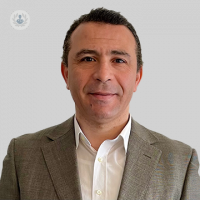Diabetic foot infection symptoms and treatment
Written in association with:Diabetic foot infection is a serious complication of diabetes that requires prompt and effective treatment. Mr Mohamed Abdelhamid, renowned consultant vascular and endovascular surgeon, provides an expert insight into the condition.

What is a diabetic foot infection?
A diabetic foot infection is an infection that affects people with diabetes. These infections can range from mild to severe, and may involve the skin, soft tissues and even the bones. Diabetic foot infections often develop as a result of foot ulcers, which are prevalent among people with diabetes.
What causes diabetic foot infections?
Diabetic foot infections are primarily caused by a combination of factors related to diabetes and foot health. The main causes are:
- High blood sugar levels: High blood sugar levels impair the immune system’s ability to function effectively. This weakened immune response makes it harder for the body to heal wounds and fight off infections.
- Poor circulation: Diabetes can cause poor blood circulation, especially in the lower extremities. Reduced blood flow means less oxygen and nutrients reach the tissues, which compromises healing and increases the risk of infection.
- Neuropathy: Neuropathy (nerve damage) is a common complication of diabetes. This can result in a loss of sensation in the feet, making it difficult to notice injuries or ulcers. Without the ability to feel pain or discomfort, minor injuries can go unnoticed and become infected.
How is a diabetic foot infection detected and diagnosed?
Detecting and diagnosing a diabetic foot infection involves a combination of clinical evaluation, patient history, and sometimes diagnostic tests.
Firstly, your vascular surgeon will carefully perform a thorough physical examination of the foot to assess the wound and surrounding tissue, checking for any visible signs of infection.
Symptoms of a diabetic foot infection commonly include:
- redness and warmth around the wound
- swelling around the affected area
- increased pain or tenderness in the infected area
- presence of pus or other discharge from the wound
- a foul odour from the infected area
Your vascular surgeon will then conduct blood tests to identify markers of infection and inflammation. Imaging tests, such as X-rays or MRIs, will also be used to check for bone involvement or deeper tissue infection. In some cases, wound cultures will be collected and analysed to identify the specific bacteria responsible for the infection.
What treatment options are available for diabetic foot infection?
Treatment for diabetic foot infections varies based on the infection's severity. It typically involves a blend of medical, surgical, and supportive approaches.
Medically, antibiotics are the cornerstone of treatment, which can be administered either orally or intravenously depending on the severity of the infection and the type of bacteria identified in wound cultures. Additionally, controlling blood sugar levels is crucial for enhancing healing and preventing further complications.
Debridement is another option, involving the surgical removal of dead or infected tissue to promote healing and reduce the bacterial load. In severe cases, surgical interventions may be necessary, such as draining any formed abscesses.
If you would like to book an appointment with Mr Mohamed Abdelhamid, head on over to his Top Doctors profile today.


